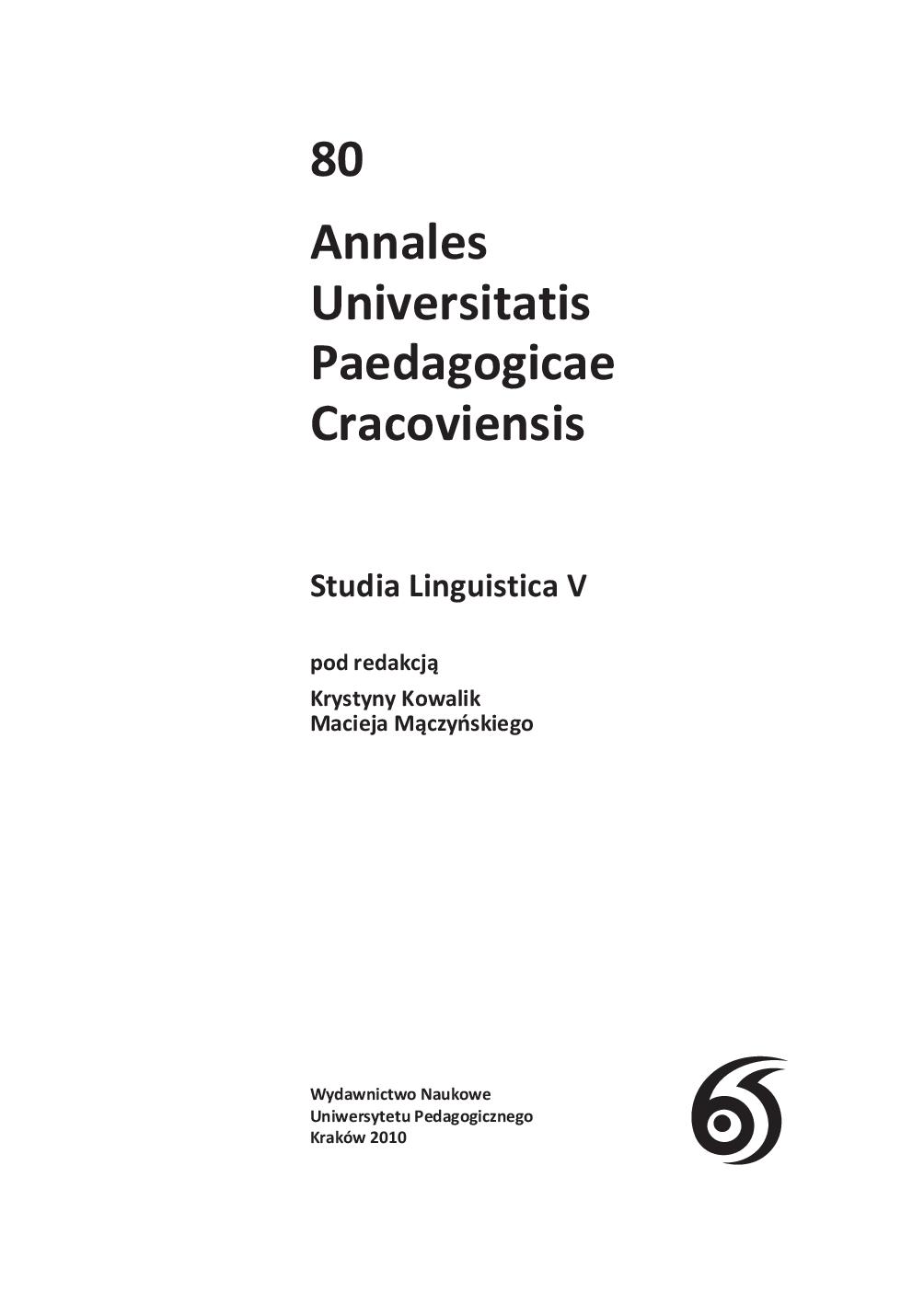„Pracuję w siti” – o specyfice języka Polaków w Londynie
Main Article Content
Abstract
emigrated after Poland’s joining the EU in May 2004, and who currently live and work in
London. The object of research is the vocabulary typical of and most often used by a particular
social group, that is the London Poles, in other words - the lexicon emerging as a result of
linguistic interference.
The author of the article also describes the phenomenon of code-switching, i.e. alternative
usage of two language systems, which is characteristic of bilingual speech.
The article is a continuation of reflections on the linguistic-cultural phenomenon of ponglish.
Downloads
Article Details
Author, submitting a text to the editorial board of the journal “Annales Universitatis Paedagogicae Cracoviensis. Studia Linguistica", certifies that the content of the article has not been published so far and that the work does not violate in any way the copyright or related rights of other person, as well as other rights of third parties, and that no one's rights to the work (or any part thereof) have been missed. After signing the contract, the property rights to the published materials are transferred to the University of the National Education Commission, Krakow.
“Annales Universitatis Paedagogicae Cracoviensis. Studia Linguistica” is an open access journal, and all its content is made available free of charge to users and institutions under the Creative Commons CC-BY-NC-ND 4.0 license (attribution, non-commercial use, no derivative works). Under this license, the authors agree that their work may be lawfully reused for any purpose, except for commercial purposes, without the prior consent of the author or publisher. Everyone can read, download, copy, print, distribute and process these works, provided that the author's marking and the original publication place are correct. Published texts may not be used to create derivative works (e.g. to translate and publish in another language without the consent of the publisher). This is in line with the BOAI (Budapest Open Access Initiative) definition. "Studia Linguistica" does not charge for submitting or processing articles.
References
Auer P., 1998, Code-Switching in Conversation, London.
Google Scholar
Bartmiński J., 1991, Styl potoczny jako centrum systemu stylowego języka, [w:] Synteza w stylistyce słowiańskiej, red. S. Gajda, Opole, s. 33–48.
Google Scholar
Bartmiński J., 2001, Styl potoczny, [w:] Współczesny język polski, red. J. Bartmiński, Lublin, s. 115–134.
Google Scholar
Doroszewski W., 1938, Język polski w Stanach Zjednoczonych Ameryki Północnej, Warszawa.
Google Scholar
Dubisz S., 1997, Typologia odmian polszczyzny poza granicami kraju, [w:] Język polski w kraju i za granicą. Materiały Międzynarodowej Konferencji Naukowej Polonistów. Warszawa 14–16 września 1995 r., red. B. Jankowska i J. Porayski-Pomsta, t. I, Warszawa, s. 35–42.
Google Scholar
Dussias P.E., 2003, Spanish-English code-mixing at the auxiliary phrase: Evidence from eyemovements, „Revista Internacional de Lingüística Iberoamericana”, 2, s. 7–34.
Google Scholar
Edelsky C., Hudelson S., Flores B., Barkin F., Altwerger B., Jilbert K., 1983, Semilingualism and language deficit, „Applied Linguistics”, 4, s. 1–22.
Google Scholar
Encyclopedia of language and linguistics, 1994, Oxford.
Google Scholar
Gramatyka współczesnego języka polskiego. Morfologia, 1998, red. R. Grzegorczykowa, R. Laskowski, H. Wróbel, Warszawa.
Google Scholar
Gumperz J.J., 1982, Discourse Strategies, Cambridge.
Google Scholar
Hansegård N.E., 1975, Tvåspråkighet eller halvspråkighet?, „Invandrare och Minoriteler”, 3, s. 7–13.
Google Scholar
Heller M., 1988, Codeswitching: Anthropological and Sociolinguistic Perspectives, Berlin.
Google Scholar
Morimoto Y., 1999, Making words in two languages: a prosodic accaunt of japanese-english language mixing, „International Journal of Bilingualism”, vol. 3, nr 1, s. 23–44.
Google Scholar
Muysken P., 1995, Code-switching and grammatical theory, [w:] One speaker two languages: Cross-disciplinary perspectives on code-switching, (Eds.) L. Milroy & P. Muysken, New York, s. 177–98.
Google Scholar
Myers-Scotton C., 1993, Social Motivations for Codeswitching: Evidence from Africa, Oxford.
Google Scholar
Myers-Scotton C., 1997, Duelling Languages: Grammatical Structure in Codeswitching, Oxford.
Google Scholar
Poplack S., 1980, „Sometimes I’ll start a sentence in Spanish y termino en español”: toward a ty- pology of code-switching, „Linguistics”, 18(7/8), s. 581–618.
Google Scholar
Sękowska E., 1992, Kontakt językowy a kontakt kulturowy (na przykładzie słownictwa Polonii angielskiej i amerykańskiej, [w:] Kontakty języka polskiego z innymi językami na tle kontaktów kulturowych, „Język a Kultura”, t. 7, red. J. Maćkiewicz i J. Siatkowski, Wrocław, s. 103–110.
Google Scholar
Sękowska E., 1994, Język zbiorowości polonijnych w krajach anglojęzycznych. Zagadnienia leksykalno-słowotwórcze, Warszawa.
Google Scholar
Słownik wymowy polskiej, 1977, red. M. Karaś, M. Madejowa, Warszawa.
Google Scholar
Szczepańska E., 1994, Uniwerbizacja w języku czeskim i polskim, Kraków.
Google Scholar
Tokarski R., 2001, Słownictwo jako interpretacja świata, [w:] Współczesny język polski, red. J. Bartmiński, Lublin, s. 343–370.
Google Scholar
Weinreich U., 1974, Languages in contact, Paris.
Google Scholar
Boztepe E., 2003, Issues in Code-Switching: Competing Theories and Models, „Working Papers in TESOL & Applied Linguistics”, Vol. 3, No 2, http://journals.tc-library.org/index.php/ tesol/Boztepe.pdf [dostęp 11.2003].
Google Scholar
Gignal M., 2008, Po angielsku, po polsku, pośrodku,: http://londyn.gazeta.pl/londyn/1,86059,5425840,Po_angielsku_po_polsku_posrodku.html [dostęp 7.07.2008].
Google Scholar
Okulski M., 2007, Najnowsze migracje z Polski – mity i fakty, [w:] Senat Rzeczpospolitej Polskiej, Migracja zarobkowa z Polski do krajów Unii Europejskiej – wyzwania dla państwa, Materiały z konferencji zorganizowanej przez Komisję Spraw Emigracji i Łączności z Polakami za Granicą pod patronatem Marszałka Senatu Bogdana Borusewicza, Warszawa, http://www.senat.gov.pl/k6/agenda/seminar/061020.pdf [dostęp 2.09.2007].
Google Scholar
Rutkowski J., 2007, Brejkanie czyli ponglish, http://wiadomosci.onet.pl/1386841,2679,kilo-skart.html [dostęp 25.01.1007].
Google Scholar
